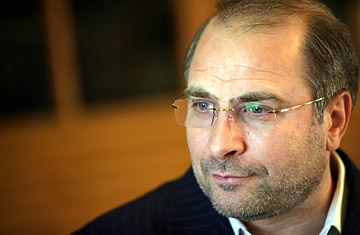
Tehran mayor Mohammad-Baqer Qalibaf in his office.
(2 of 2)
You have aimed for transparency in your management of the municipality [of Tehran], giving biannual reports on the state of city projects, the monies spent, and putting time limits on development projects. This should be absolutely normal, but in Iran, it's the exception. Why is there such poverty in management here?
The main point is that our economy is public and must be privatized. A bill's been signed and we're in that process, but it's much too slow, and the government is investing massively in business at the same time that it's supposed to privatize its shares of the economy. This is contradictory. When the government has a wrong outlook on the economy, when it has a political take on the economy, I think these problems come about. We need more reason and farsightedness on the economy, not just looking at our own tenure but beyond that. Otherwise I think the rise in oil prices was a golden opportunity that the government not only didn't take advantage of, but even turned it into a threat to domestic production because of the high volume of imports that the government pursued with the oil money.
Some say the economy has also been adversely affected by the sanctions.
Certainly, our negative relations with the West have an impact on our economy, we can't deny that. Our relations have led to what we see today, which is a third round of sanctions. But this does not mean that because of these problems we will withdraw our claim to our rights. I think the world must accept that the issue of nuclear energy is a technical and legal issue; it is not a political and security issue. However, it is clear that we could have used better means of conveying this to the West and the rest of the world. It is clear that the U.S. doesn't want the progress of this country because that wouldn't fit in with its interests in the region. But we must do our best with the help of the [International Atomic Energy] agency, the E.U. and other international bodies to resolve this issue, and abstain from unnecessary rhetoric. We need to proceed with reason and with a more suitable rhetoric.
The U.S. accuses Iran of supporting terrorism in the region. What's your view of Iran's role in the Middle East?
I think Iran's role in the Middle East is a unique one. Friend and foe accept this. And that's because of our geopolitical advantage, because of the special position that the Islamic Republic and our people have. After all, we have an open-minded and educated people, great revolutionary and economic potential, belong to the region's progressive countries, and are unique in our democracy. Right now, the U.S. is supporting powers in this region who don't even value the 50% of their populations who are women, where there is no democracy, no elections, and whatever little there is in exercise of people's power is ceremonial.
Hence it's clear that our country holds a lot of potential and its role in the Middle East is paralleled by few others. The first point is that the world powers must accept this reality. You mentioned terrorism. In the case of Iraq, it is under American occupation, not our occupation. The Americans organized elections there and a government arose out of those elections. Since then we have accepted that government and helped it. Iraq is our neighbor. They are Muslims. We have cultural and political common ground. So what's this talk of terrorism?
Take the example of Lebanon. Is the presence of Hizballah really a terrorist one? Who then killed Imad Mughniyah [the reputed master-terrorist and Hizballah collaborator who was assassinated in a bomb attack in Syria in February]? What Israel is doing Gaza... is there any act of state terrorism more tragic than that? But I think in fact that Iran and the U.S. have many common interests in the region; our position in the region should not be one of opposition, but friendly competition with other powers.
Do you see an improvement in relations with the U.S.?
As the Leader[Ayatollah Ali Khamenei] pointed out as well, no one said that there will be conflict between us forever. Not at all. It is not reasonable politics to say we don't ever want relations. First we should note that it wasn't us who broke relations with the U.S. It was the U.S. who broke relations with us. But we believe that now that we want to reestablish relations we have to do it in a clear and reasonable framework. We sat down at one table and talked about Iraq [in Baghdad in March 2007]. This shows that we can sit down at other tables too and talk with the U.S. about other matters. The important thing is that we don't set any preconditions. And this comes back to the first point I made, I truly believe that the West must change its view of Iran. Many Western officials still see us in the mold before the revolution. They think they can continue what was before the revolution. They must completely eliminate that thought from their minds. That will never happen. A revolution has happened here and people have chosen a different path, and already, 30 years have passed. The West must believe this path and come talk to us. If the West changes its mind on this, many opportunities will open for both of us.
